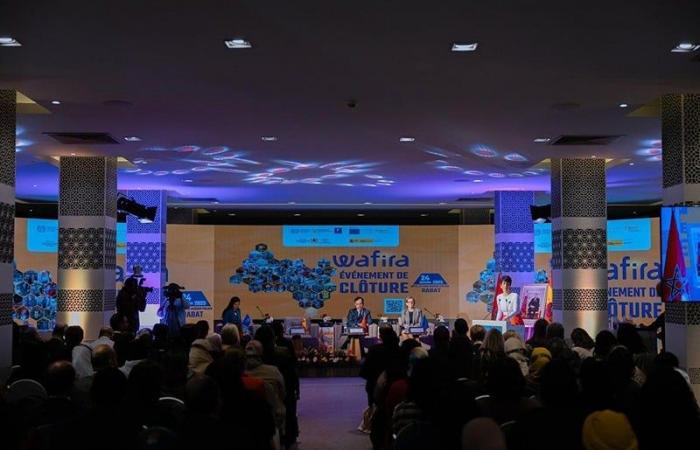The dynamic cooperation between Morocco and Spain in the field of migrant integration has given rise to a fruitful collaboration, allowing the integration of women seasonal workers. Thanks to the “Wafira” program, many women have been able to flourish by developing income-generating projects, thus transforming their professional careers and their daily lives, the Minister of Economic Inclusion, Small Business, Employment and Skills, Younes Sekkouri.
The closing ceremony of the first edition of the “Wafira” initiative took place this Friday, January 24, 2025 in Rabat, bringing together Moroccan and Spanish officials, as well as a large number of agricultural workers who benefited from the support and support offered by this program which offers an innovative approach aimed at improving the living conditions of seasonal workers. It offers them the valuable opportunity to combine salaried employment in Spain while benefiting from quality training, thus allowing them to become self-employed upon their return to Morocco.
On this occasion, Sekkouri recalled the positive results achieved thanks to the collaboration between Rabat and Madrid in this area, indicating that this partnership is not limited to meeting the immediate needs of the actors involved, but also strives to take into account the concerns of migrants themselves. He said this approach is invaluable, as it fosters much-needed mutual respect.
Sekkouri asserted that “ this project is of crucial importance, as it embodies the cooperation and harmony established with our Spanish partner, supported by the European Union“. He added that “ such projects must serve as a reference, because they integrate individuals and place them at the heart of society, thus contributing to their reintegration after the end of their period of work abroad« .
He also clarified that the initiative aims to integrate those who choose to leave their village or town of origin, to separate from their family to seek opportunities abroad, thus acquiring professional experience and income before return and end their work period.
Furthermore, the minister noted that “ the women who return from this migration will not return identical, having evolved and changed social status, which calls for sustained efforts to effectively reintegrate them into our project« .
-For her part, Elma Saiz, Spanish Minister of Inclusion, Social Security and Migration, highlighted that this collaboration model effectively responds to the labor needs of key sectors, while promoting transfer of skills and development of communities of origin. She thus underlined the importance of consolidating the principles of dignified and beneficial migration for all.
« Far from being a simple experiment, this project proved to be a catalyst for transformation, which is why we hope there will be a second edition“, she indicated. The Spanish official also affirmed that these projects integrate a pronounced gender dimension. “ Above all, these are women’s stories. Hardworking, courageous and determined women, like Aziza Zbirat, who erected a greenhouse equipped with irrigation systems and solar panels, allowing her to diversify her production and harvest products in high demand on the local market“, she explained.
« Spain and Morocco are joining forces to begin, with the support of the EU, the ICMPD and the ILO, a second phase of the Wafira project. We also hope to confirm the participation of other countries to amplify its impact“, she added.
It should be noted that the “Wafira” program is part of the continuity of collaborations already established between the two countries, in particular through circular migration, one of the main representatives of which is the Ordinance which regulates collective management contracts at origin (GECCO). Thanks to this initiative, nearly 18,800 people, mainly women, will travel to Spain in 2025 to take up seasonal positions, while benefiting from careful supervision of their working conditions and their rights.






